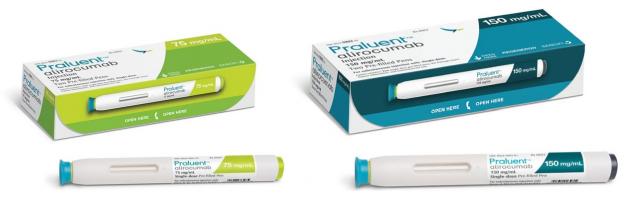
Sanofi-Aventis Korea said Friday that it has published the results of ODYSSEY KT, a Korean sub-analysis research of Praluent, a dyslipidemia therapy, on the Korean Journal of Internal Medicine.
Praluent inhibits proprotein convertase subtilisin/kexin type 9 (PCSK9) from binding to low-density lipoprotein receptors (LDLRs). The PCKK9 inhibitor lowers high cholesterol levels known as low-density lipoprotein cholesterol (LDL-C).
The company conducted the ODYSSEY KT to confirm the safety and efficacy of the treatment by administering 75mg of Praluent every two weeks on 83 hypercholesterolemia patients, who despite the maximum dose of statin therapy had a hard time controlling their LDL-C, for a total of 24 weeks.
Sanofi randomly divided the participants into two groups and either gave a combination of Praluent and a lipid-lowering drug for 40 patients or a placebo and a lipid-lowering drug for the other 43.
Only three out of 40 patients in the Praluent-treated group did not reach the LDL-C treatment goal of less than 70 mg / dL at the eighth week.
The results of the study showed that the 75 mg dose of Praluent treatment significantly reduced LDL-C levels from the fourth week, and maintained its target goal level until the end of treatment. Most of the patients in the Praluent treatment group reduced the LDL-C levels by 65.7 percent at the 24th week and achieved a primary efficacy assessment with an excellent LDL-C reduction compared to the placebo group.
About 37.5 percent of the Praluent treatment group also maintained their LDL-C levels below 25 mg/dL for two consecutive sessions, while 10 percent of the group remained below 15 mg/dL.
Also, the incidence of adverse events (TEAE) between the Praluent treatment group and placebo groups did not show any statistically significant difference.
As a result of the research, the team concluded that the sub-analysis was consistent with the efficacy and safety profile of other phase 3 ODYSSEY trials.
“Cardiovascular disease is the second leading cause of death in Korea. Since LDL-C is a major risk factor for coronary heart disease, it is essential to control LDL-C to a target level (<70 mg / dL) in order to prevent cardiovascular disease,” said Professor Nam Chang-wook at Department of Internal Medicine at Keimyung University Dongsan Medical Center. Park is the first author of the research.
The results of the sub-analysis for Koreans showed that the majority of Korean hypercholesterolemic patients with high cardiovascular risk can control LDL-C levels by taking 75 mg of Praluent once every two weeks, he added.
The therapy is available as a prefilled pen in 75 mg/mL and 150 mg/mL doses. Patients can self-inject the treatment once every two weeks after receiving an education session from a doctor.

